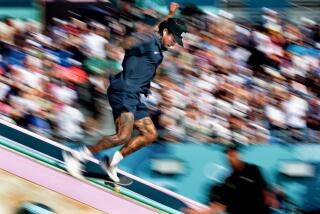Now He’s the One Doing the Clapping
- Share via
NAGANO, Japan — A week ago, Casey FitzRandolph didn’t have a kind word to say about clapskates, speedskating’s newest weapon. You should hear him now.
“In a world without clapskates, I would be surprised if I was sitting in third place right now,” he said Monday, after skating to that position in the first round of the men’s 500-meter race.
“I don’t know where that one came from. I don’t know where that race came from.”
Wherever it came from, it moved FitzRandolph into prime position for a U.S. medal in Tuesday’s second round.
On a day of Olympic records, FitzRandolph trailed only Hiroyasu Shimizu, the Japanese world-record holder, and Kevin Overland of Canada. All broke the old Games’ 500-meter mark of 36.33 seconds, but Shimizu, skating after Overland and FitzRandolph, broke it most resoundingly, skating 35.76.
That didn’t match the 35.39 he had two years ago on the Olympic rink in Calgary, Canada, but it was better than Overland’s 35.78 and FitzRandolph’s 35.81.
Had this been any other Olympics, the race would be over, Shimizu would be wearing the gold medal, Overland the silver and FitzRandolph the bronze. But this year, the International Skating Union brought the Olympic 500 in line with other international competitions. In World Cup races, the 500 is skated twice, each skater starting once in the inside lane and finishing in the outer lane, and once on the outside, finishing inside. Thus, they will do it all over again Tuesday.
For FitzRandolph, though, Monday’s was a breakthrough race.
Clapskates--so called for the sound they make--are spring-loaded contraptions that allow the skater to keep the blade on the ice while lifting his heel, much in the manner of a cross-country skier. They showed up first in Europe last year and American skaters, unable to get them until last fall, have had to play catch-up in new techniques dictated by the new skates. FitzRandolph, an international star last season, had trouble adjusting and suddenly found himself scrambling.
Now, it appears, he is a major threat once again.
“I’d have to say that, skating a 35.8 like that and being third, yeah, I’m back where I was,” he said.
And, he said, it was changes to equipment, not technique, that finally made the difference.
“It’s a big equipment deal and I made a lot of changes, even this week, that, if I hadn’t made, I’d be in 25th place. . . . Probably the most important thing was rounding out my skates. [The blades] were way too flat, coming in here, and I couldn’t skate a last 100 [meters] to save my life. So we rounded out the bottom and now I can turn.”
Despite his problems with the new skates, he said, he never gave up on himself.
“I didn’t expect to go 35.8 and be in third place, but I knew inside it was a possibility,” he said. “I knew it was a good time and I would be happy if it was first or 15th. Going in, I said, ‘If I can go 6.2 or better, then I’ll be a real happy guy.’ Then I saw 5.8 and was ecstatic.”
Not ecstatic were the three other U.S. skaters. David Cruikshank, Bonnie Blair’s husband, was 2lst, Marc Pelchat 32nd and Cory Carpenter 39th.
Carpenter considered himself at least somewhat a victim of circumstances. Starter Stan Strzykalski of East Troy, Wis., called 10 false starts and interrupted several other starts to issue warnings to eager skaters. Russian Sergey Savelyev was disqualified because of a second false start and Carpenter had to skate alone.
“That affects my skating,” he said. “It’s hard for me to skate alone.”
There was some grumbling about Strzykalski’s work and Peter Mueller, 1976 gold-medal winner for the U.S., a former U.S. coach and now sprint coach for the Dutch team, snapped, “The starts were just fine. The starter was the problem.”
An ISU rule forbids starters from talking to the press unless there is a formal protest. There was none, so Strzykalski was unable to explain his calls.
But Gerard Kemkers, a U.S. coach, said Strzykalski had done precisely what his position demands.
More to Read
Go beyond the scoreboard
Get the latest on L.A.'s teams in the daily Sports Report newsletter.
You may occasionally receive promotional content from the Los Angeles Times.






